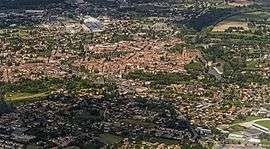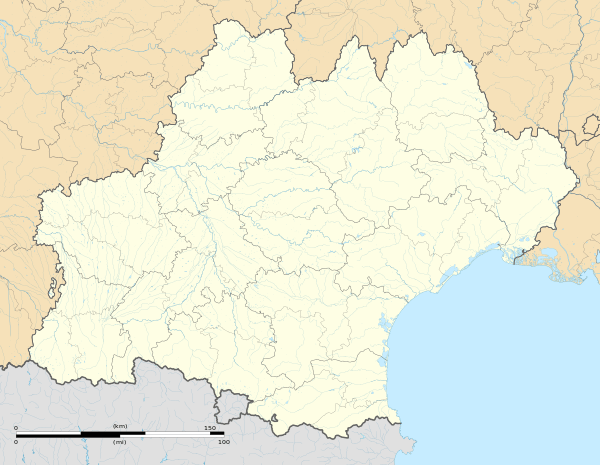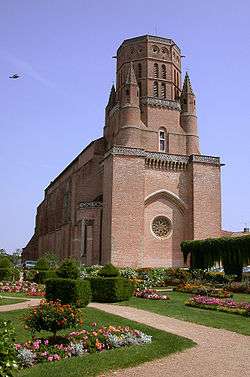Lavaur, Tarn
| Lavaur | ||
|---|---|---|
| Commune | ||
 An aerial view of Lavaur | ||
| ||
 Lavaur Location within Occitanie region  Lavaur | ||
| Coordinates: 43°41′59″N 1°49′11″E / 43.6997°N 1.8197°ECoordinates: 43°41′59″N 1°49′11″E / 43.6997°N 1.8197°E | ||
| Country | France | |
| Region | Occitanie | |
| Department | Tarn | |
| Arrondissement | Castres | |
| Canton | Lavaur Cocagne | |
| Intercommunality | Tarn et Agout | |
| Government | ||
| • Mayor (2001–2008) | Bernard Carayon | |
| Area1 | 62.83 km2 (24.26 sq mi) | |
| Population (2006)2 | 10,369 | |
| • Density | 170/km2 (430/sq mi) | |
| Time zone | UTC+1 (CET) | |
| • Summer (DST) | UTC+2 (CEST) | |
| INSEE/Postal code | 81140 /81500 | |
| Elevation |
105–274 m (344–899 ft) (avg. 141 m or 463 ft) | |
|
1 French Land Register data, which excludes lakes, ponds, glaciers > 1 km2 (0.386 sq mi or 247 acres) and river estuaries. 2 Population without double counting: residents of multiple communes (e.g., students and military personnel) only counted once. | ||
Lavaur is a commune in the Tarn department in southern France. It lies 37 km southeast of Montauban by rail.
History
Lavaur was taken in 1211 by Simon de Montfort during the wars of the Albigenses, a monument marking the site where Dame Giraude de Laurac (Lady of Lavaur) was killed,[1] being thrown down a well and stoned to death.[2] The town was also taken several times during the religious wars of the 16th century.
Geography
Lavaur stands on the left bank of the Agout, which is here crossed by a railway-bridge and a fine stone bridge of the late 18th century.
Demographics
Population:
- 1906: town 4069; commune 6388
- 1999: commune 8537
- 2006: commune 10,369
Sights

From 1317 till the French Revolution Lavaur was the seat of a bishopric; Lavaur Cathedral, dedicated to Saint Alan, was built for this purpose, dating from the 13th, 14th and 15th centuries, with an octagonal bell-tower. A second, smaller square tower contains a jaquemart (a statue which strikes the hours with a hammer) of the 16th century. In the bishops garden is the statue of Emmanuel, comte de Las Cases, one of the companions of Napoleon at Saint Helena.
Economy
The town carries on distilling and flour-milling and the manufacture of brushes, plaster and wooden shoes.
Notable residents
- Pierre Fabre, founder of Laboratoires Pierre Fabre[3]
- Étienne de Voisins-Lavernière (1813–1898), French deputy and then senator for Tarn
Miscellaneous
There is a subprefecture and a tribunal of first instance (a lower Court of Justice).
See also
References
- ↑ "Archived copy". Archived from the original on 2010-03-01. Retrieved 2010-04-30.
- ↑ "Languedoc (Traditional province, France)". www.crwflags.com. Retrieved 13 April 2018.
- ↑ "Pierre Fabre, founder of pharmaceutical giant, dies". Agence France Presse. France 24. 2013-07-20. Archived from the original on 2013-07-23. Retrieved 2013-08-17.
| Wikimedia Commons has media related to Lavaur, Tarn. |
.svg.png)